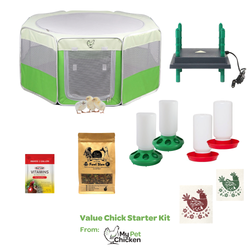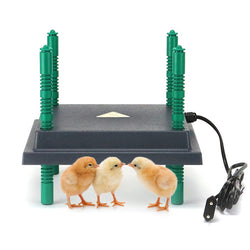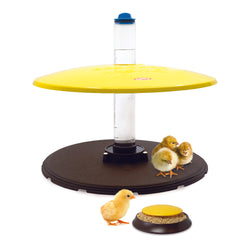Chick illnesses and issues (overview)
Back to blog
When you're worried your new baby chicks are ill, there are a number of things that could be responsible!

Here's a quick overview of the most common illnesses, conditions, and issues that may cause you concern with your new baby chicks. It is not an exhaustive list. Please click on the links for more details about each.

Here's a quick overview of the most common illnesses, conditions, and issues that may cause you concern with your new baby chicks. It is not an exhaustive list. Please click on the links for more details about each.
Illnesses and conditions common to baby chicks
- Aspergillosis, or brooder pneumonia - Primary symptoms of this illness are respiratory.
- Brooder too hot or too cold - If chicks are too hot, they'll be as far from the heat source as possible and may be panting with their mouths open. If chicks are too cold, they may be huddling under the heat source, peeping in distress, and piling on top of one another in order to try to stay warm enough. Read how to keep your brooder the right temperature for your chicks.
- Chicks suddenly falling over asleep - Sudden somnolence is fairly normal for baby chicks, like it is for puppies, kittens and other babies. However, it can give you a real shock when they suddenly just keel over, or when you see them laying on their backs with their legs in the air.
- Coccidiosis - This is a common chicken illness in young chicks that can cause a variety of general symptoms as well as loose droppings.
- Crossed beak - Baby chicks may sometimes get crossed beaks, where the top and bottom beak don't properly meet up.
- Curly toes - Neurological symptoms of this chicken illness can include paralysis/partial paralysis, ataxis
- Encephalomalacia - Symptoms of this vitamin deficiency can include loss of balance, circling, head shaking or tremors, eventually convulsions, and paralysis.
- Lump on your chick's chest - there is usually nothing to be concerned about in this instance, but read to see when you need to take action.
- Marek's Disease - Symptoms of this illness can include paralysis/partial paralysis (particularly of the legs), ataxis, blindness
- Omphalitis/infected yolk sac/ mushy chick disease - This illness causes a variety of different general symptoms like lethargy and loose stools
- Polyneuritis or "star gazing" - Symptoms of this illness can include head shaking, tremors, convulsions, paralysis of neck muscles
- Pasted vent - This occurs when dried droppings on a chick's vent keep the chick from being able to defecate.
- Salmonella - Please note that your chicks don't have to be sick with salmonella to pass it to you; salmonella is found in the feces of all animals, including humans, and including baby chicks, too. If you handle chicks that have been walking around in poopy litter, and you fail to wash your hands before bringing them to your mouth, for example, you could get sick. Read about Salmonella illness, and also about how to practice good biosecurity
- Spraddle leg - Your chick may have spraddle leg if s/he seems too weak to stand. This is an easy issue to address at home if caught early, so be sure to read more at the link
- Unhealed navel or umbilicus - Don't mistake an unhealed navel or drying umbilical cord for a pasted vent. Read how to tell the difference.
- Weak chicks not eating or drinking - Click the link to find out how to help weak baby chicks who are not eating or drinking.



